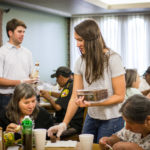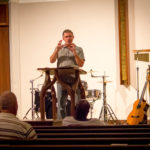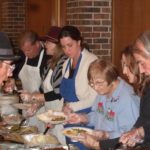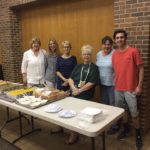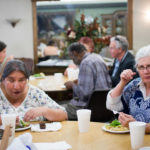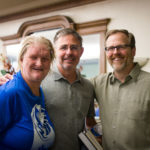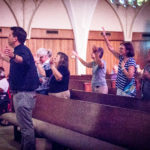Oscar Brown is in the kitchen of Cliff Temple Baptist Church in Oak Cliff, passing out paper plates filled with salad and pizza. He’s there to serve at Thursday Night Life, a weekly gathering when members of The Well Community are invited to worship and enjoy a hot meal together. Volunteers like Brown prepare the meal, then serve it to the members after a time of music and Bible teaching.
Brown has been giving his time at The Well with a group from Kessler Park United Methodist Church for about five years. But, he says, “I remember that first time like it was yesterday.”
Not knowing what to expect, he showed up with what he describes as a “self-righteous attitude.” He was there to help those less fortunate, those dealing with a mental illness or struggling with addiction. He was there to give, not receive.
But, as he recalls, that first evening was humbling. “I remember leaving with the realization that they’re just people with backgrounds common to mine,” Brown says. He explains that many of us think we’re impenetrable, but life could very easily have turned out differently for any one of us. Interacting with members of The Well demonstrates that firsthand.
For many volunteers, serving at The Well Community has been an eye-opening experience. It has allowed them to see individuals dealing with serious mental illnesses as people, rather than as a group with a label.
Dave Larlee, Associate Pastor of All Saints Dallas, says that it’s easy to make assumptions about those who live with mental health challenges. He admits he had preconceived ideas about meeting the needs of Well Community members when he began preaching occasionally at their Thursday night worship service, but as he’s gotten to know the members he’s found friendships rather than one-sided opportunities for ministry. “When you go to The Well they just love you. The love is so tangible,” he explains.
Spending time with those who live with mental illnesses can play a big role in fighting the stigma that’s often associated with these conditions. Without personal connections, it’s easy to lump all those who struggle into a group defined by stereotypes.
Assumptions about mental illness often prevent those who live with these conditions from building connections with others—even with their own families. For many members, The Well Community is their only family. This sense of community is one of the reasons Brown keeps coming back to serve. Sadly, he says. “These folks have been forgotten by society.”
Ann Tabony, who teaches art classes at The Well, agrees. “This is a forgotten group of people. This is the group of people that society wants to push aside,” she shares. “I like to have [members] to have one place where they go where they’re treated like I would treat another person.”
For many volunteers, serving at The Well has been not only eye-opening but humbling as well. “I thought I went to help them, but they help me,” Larlee shares. Brown has had a similar experience. “I get more out of it than I could ever give,” he says. “I wish everybody at some point in their life would come be a part of this.”
The Well Community is always looking for volunteers to serve at Thursday Night Life or our other events. Think you might be interested? Don’t hesitate to call or email! We would love to answer your questions and find the best place for you to use your unique gifts. Contact us.
Be sure to follow us on Facebook and Twitter to learn more about The Well, mental illnesses and the role of faith in recovery, as well as how you can make a difference in the lives of those who live with these conditions.


